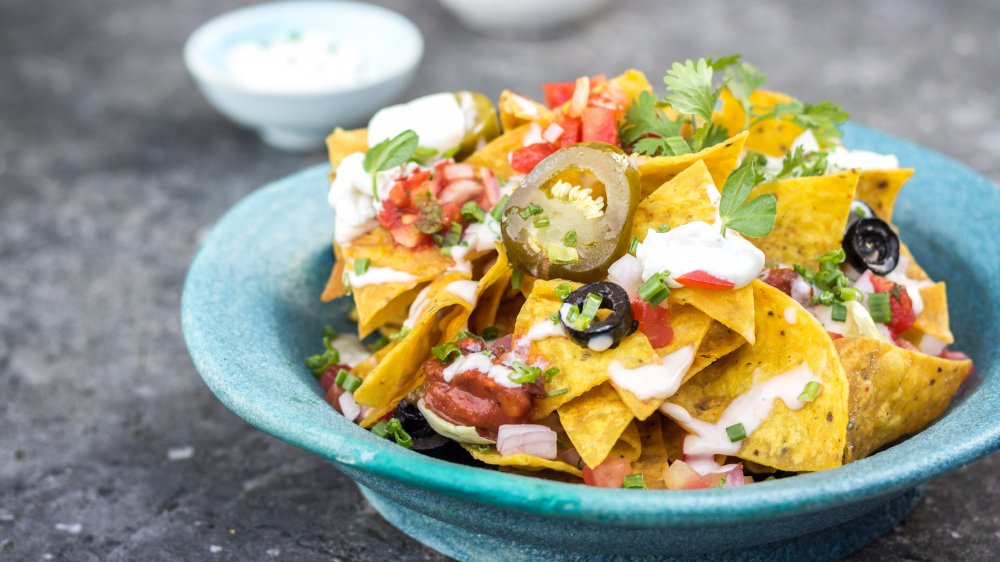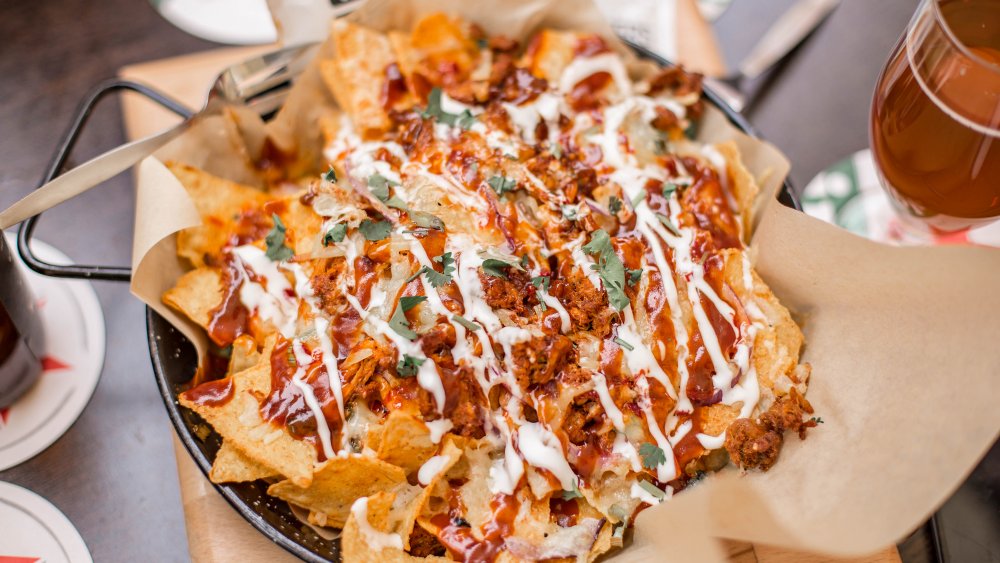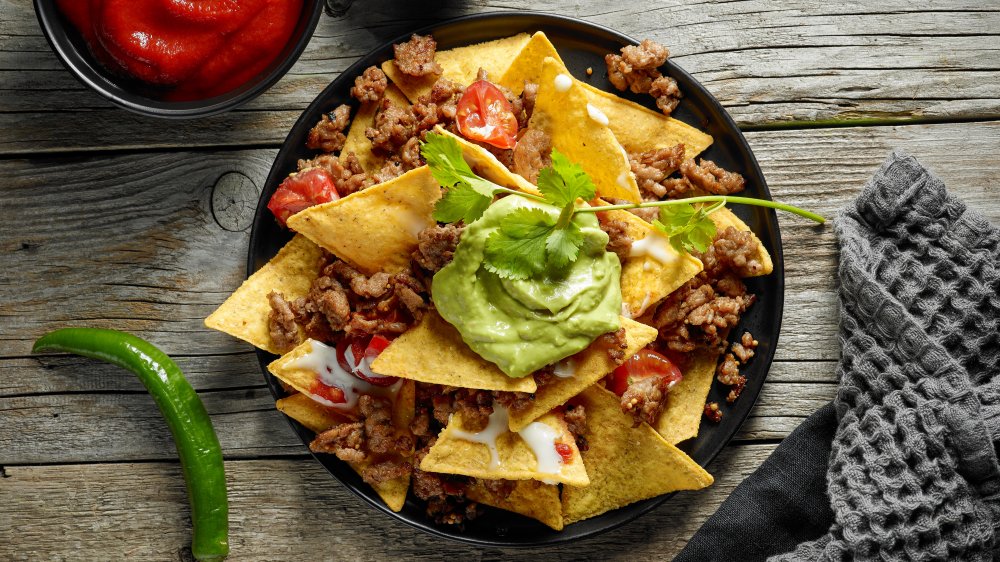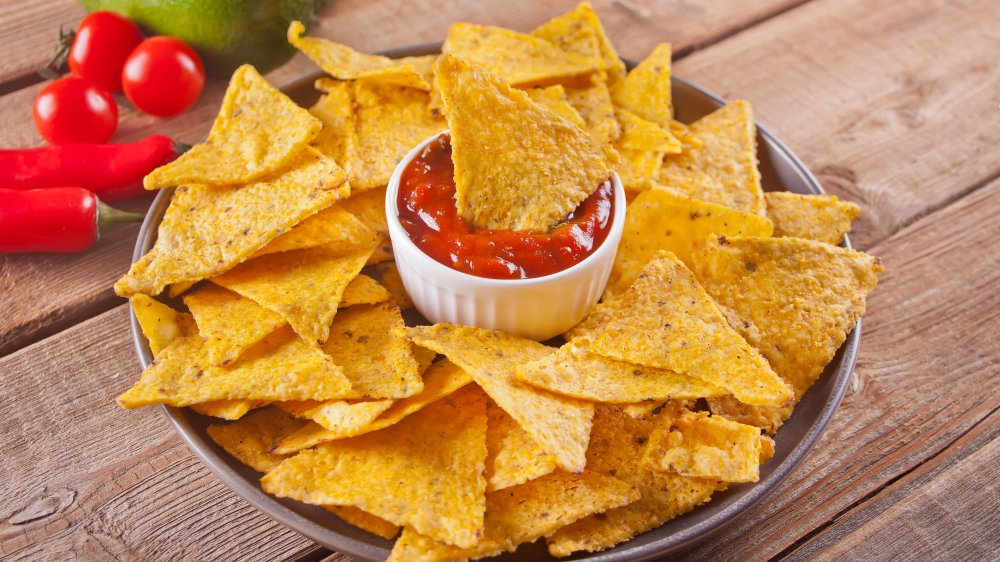You Should Never Order Nachos At A Mexican Restaurant. Here's Why
Nachos — they're tempting, right? Combine crispy, salty chips, oozing cheese in shredded or liquid form, and an array of optional toppings like beans, guacamole, sour cream, meat, and salsa, and the result offers a taste and texture explosion in every bite. No surprise that chefs and home cooks alike have offered up endless takes on the classic. Heck, they've even made their way to the dessert menu.
Of course, some critics have called out Mexican restaurants' nachos for being an underwhelming menu item. But that's only one reason they should not feature in your next south-of-the-border order.
For starters, some believe that nachos barely qualify as true Mexican fare. According to Fox News, they actually were invented there, by Ignacio Anaya (who was a maître d', not a chef, at a spot called the Victory Club), when he scrambled to feed some "hungry U.S. military wives" from Fort Duncan, located by the restaurant's town of Piedras Negras, Mexico. As legend has it, that first attempt was pretty bare-bones: fried tortilla chips, shredded cheddar, and sliced jalapeños — a mish-mash made on the fly, and labeled after Anaya's nickname, Nacho.
Nachos are a notorious calorie bomb
Unfortunately, Eat This, Not That! points out that modern renditions of nachos pile on far more calories than that simple original, thanks to loads of fat-laden toppings. WebMD calls nachos one of the "worst Mexican dishes for your health," as the gut-busting combo of fried chips, heaps of cheese, beef, beans, sour cream, and guac can lead even diners who share an order to take in more than a cheeseburger's worth of calories and fat.
And let's face it: Nachos are usually considered an appetizer by Mexican restaurant-goers. You'll consume all of that before you've even made a dent in the main part of the meal.
Furthermore, according to The Cheat Sheet, nachos are not only loaded with "layer after layer of artery-clogging ingredients," they're "a total waste of money" — after all, many of its main ingredients wouldn't set you back much.
At home, you also have the freedom to tap into healthier alternatives, away from heavy-handed restaurant chefs, who are apt to pile plates with mega-mountains of toppings. Cooking Light recommends forgoing the "loads of cheese and meat" that nachos are known for, replacing instead with more flavorful, lighter options, such as pickled jalapeños, fresh avocado, crab, lobster, kimchi, or jackfruit.
Fast-food nachos are bad news, too
Nachos aren't just a poor choice at Mexican restaurants; fast-food and chain-restaurant options also offer up abominable examples of unhealthiness. Self points out that Taco Bell's now-discontinued Volcano Nachos packed in 980 calories, 61 grams of fat, and 1,870 milligrams of sodium, thanks to its overload of chips, beans, beef, cheese, "cheesy molten hot lava sauce," tortilla strips, and (hilariously) low-fat sour cream. Meanwhile, Eat This, Not That! labeled the Salsa Verde Nachos appetizer at Applebee's its "worst offender," at nearly 1,200 calories (too bad the chain's current version, Neighborhood Nachos, is far worse).
Looking for a less-gluttonous replacement? For a more authentic and healthier choice, The Cheat Sheet recommends nixing the nachos and swapping with chilaquiles instead for a full-flavor experience that slashes calories and fat in half.
Or, if you simply must order the nachos the next time you're eating out, there are some modifications that can help cut down on the overloads of fat and calories. Healthy Dining Finder recommends thinking in terms of substitutions: Load up on low-cal and healthy toppings like salsa and guac, ask for half the cheese, request sour cream on the side, choose lean proteins over ground beef, and scoop it all up with baked, versus fried chips if available.
The chips and salsa may be 'pre-owned'
According to experts, the basic chips and salsa at a Mexican restaurant can actually be a solid litmus test for the establishment's overall quality, as stale chips and salsa poured straight from a foodservice bag denote a definite lack of care from the kitchen (via Insider).
But some restaurants have landed in hot water for more serious offenses than shoddy ingredients. In 2016, Su Casa, a Mexican restaurant in South Haven, Michigan, made headlines after being accused on Facebook by the mother of an employee, who chastised the owner for reusing chips and salsa (via Vice).
Even worse, owner Edgar Suarez admitted the practice of "repurposing" leftovers to Michigan news channel WWMT, saying "I thought it was okay .... if people did not touch them or they were still in the tray, I thought everything was good."
One must assume these types of practices aren't running rampant in the vast majority of restaurants out there, but it's still another good reason to make your own nachos at home — or just ditch the Mexican-restaurant staple altogether, and instead choose something a bit less unhealthy and a lot more authentic.



